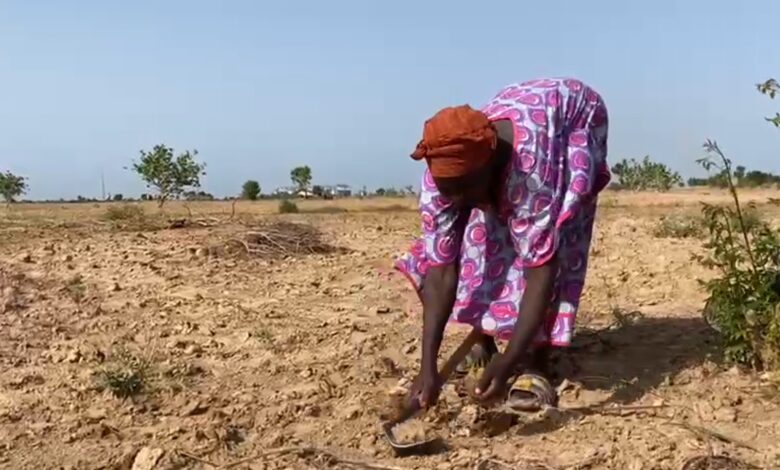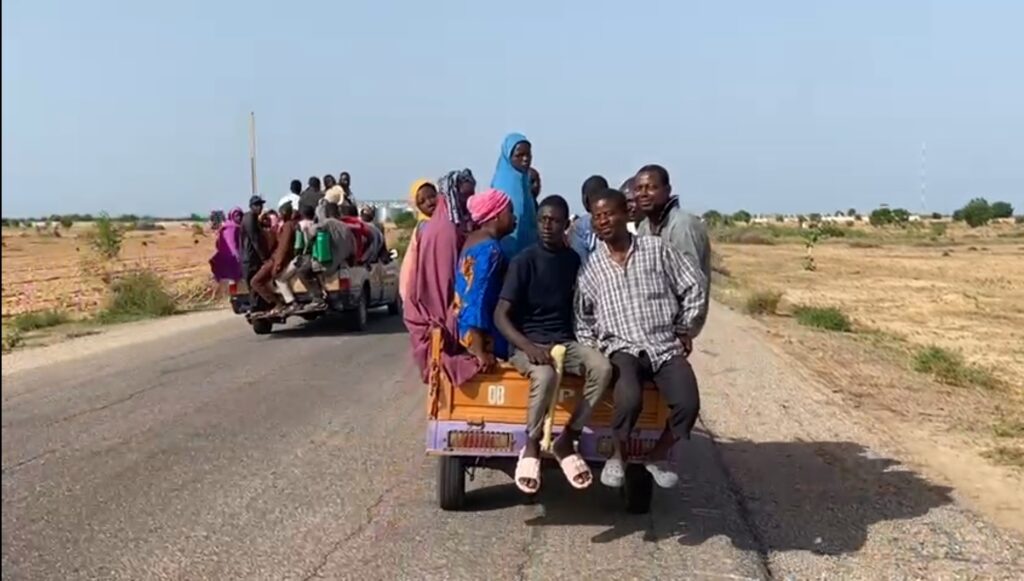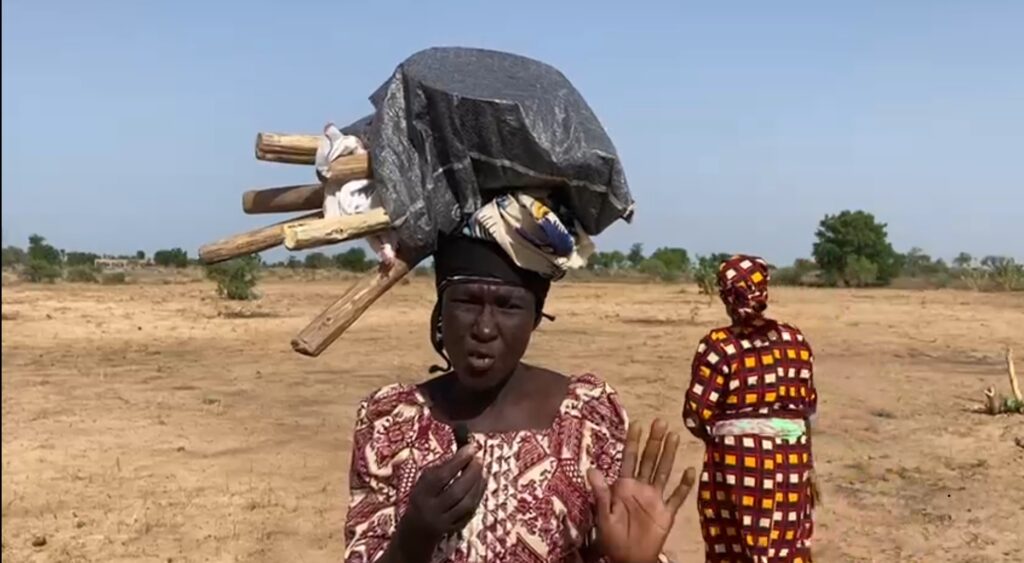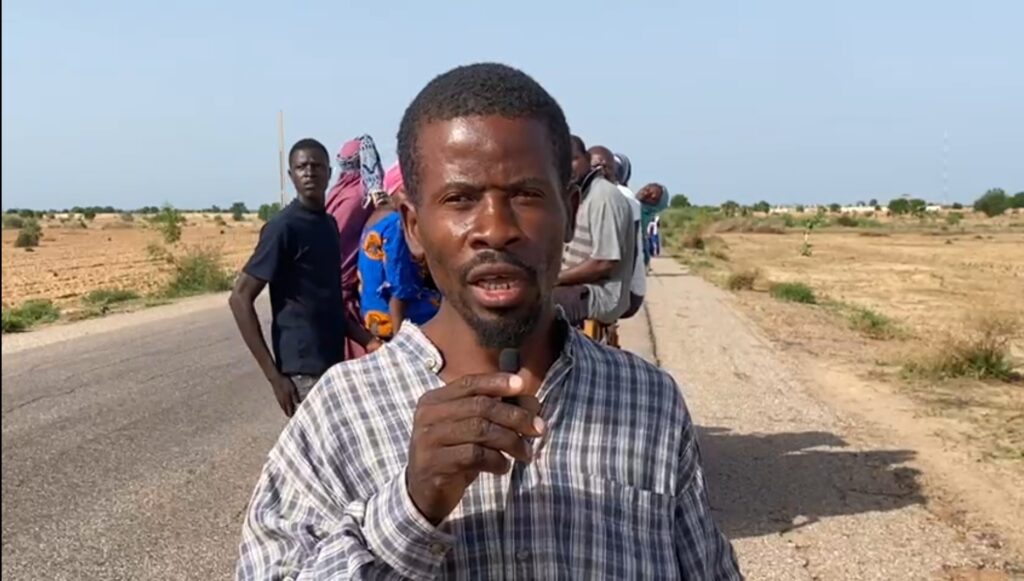Farmers Risk It All To Work Fields In Nigeria’s Borno

Running late, 61-year-old grandmother Ammama Mohammed rushed to collect her farming tools and head out to her fields from her home in Molai, near Maiduguri.
Farmers in Borno state North East Nigeria only have a few hours they can work on their fields during the day. The later they work, the more unsafe it is.
Usually Ammama would have left much earlier, but that day she had to go and pay her respects to her bereaved sister and her family.
Their son had been killed by armed insurgents the day before.
The dead man, her nephew, was one of eight farmers brutally killed as they were working in the fields.
Despite her nephew’s death, Ammama has a grim determination to go to work.
“I’ve no option but to leave for the farms because that’s what we depend on. We can only take to our heels if we see the Boko Haram terrorists coming our way,” she says.
“We have no other way to survive. If we don’t go to the farms, we will all starve,” she said.
Missing
HumAngle reported the burial of seven farmers and wood gatherers who were beheaded on June 15 by terrorists.
“Another body was found in the bush later on Friday afternoon,” Ammama said. “We still have about three persons that are still missing; we don’t know if they are alive or dead.”
Like many others in her community, Ammama refused to let the constant threat of Boko Haram attacks deter her from pursuing her livelihood. She sets off on foot, trekking approximately five kilometres from Molai to reach her farmland.

For these farmers, the decision to return to their fields was not easy, but their determination to provide for their families and survive in the face of extreme adversity kept them going.
“We cannot give up; we must keep fighting for survival,” says Ammama.
The farmers had to adapt to new strategies, such as planting crops in smaller, more dispersed fields near the highways, to reduce the risk of attack.
“We know the risks, but we have to take them,” says another female farmer.
“We cannot let fear control us. We have to keep moving forward.”
Return to farm
The farming season in most parts of the state typically begins in June when the heavy rains arrive, except for the southern region, where the rain starts earlier.
Recently, the Borno state government launched a program to encourage a mass return to farming after years of low activity due to the violent presence of Boko Haram. However, farmers still face challenges accessing their central lands as security forces cannot guarantee their safety beyond a few kms from the township or highway.
For many locals, the journey to these farming sites involves annoying bureaucracy. They must queue in long convoys of vehicles or on foot at a military checkpoint to obtain a tiny permit that allows them to venture outside the city gate for a limited time.
“We just have to leave the farms on or before 2 pm, or else you are on your own,” says a female farmer, emphasising the ever-present danger.
Along the treacherous Maiduguri-Biu highway, farmers share their fears, experiences, and hopes for the future as they cultivate their crops.
Exposed location
Abdulmumumi Bulama, a local security operative working with the agro-rangers, worries the farmers with plots deeper in the dangerous bushlands needed more protection.
As they burn their cleared farms before tilling the land for planting, plumes of smoke rise in the distance – a signal that inadvertently exposes their location to potential attackers.
Pointing at the columns of smoke rising into the sky, Bulama said: “That’s our farmers burning their cleared farms ahead of tilling the land for planting, but such smoke sometimes gives them away to terrorists who could use the smoke to trail them for an attack.”
The recent beheadings of farmers and wood fetchers have sent shockwaves across the region, leaving many on edge and afraid. As the farming season progresses, the need for increased security measures and support from the government becomes more urgent than ever.
Sainna Buba, a former cabinet member who now supervises the committee coordinating safety mechanisms for farmers, assures that the government has implemented various measures to protect farmers in outlying areas.
“The introduction of the Agro-Rangers Force is intended to ensure their safety,” he said. “However, the number of rangers available seems woefully inadequate; that is why our farmers have become easy targets to these insurgents. The last place where the attack occurred was not more than five kilometres from the village of Molai.”
These farmers, who provide sustenance for themselves and their communities, insist they deserve the right to cultivate their lands without fear of violence or death. The stories of their hardships and the deadly risks they face are a stark reminder that the battle against Boko Haram is far from over – and that the livelihoods of many Nigerians hang in the balance.

Ijagda Luka Thliza, a woman in her early fifties, said she had been farming along the Damboa-Biu road farmlands for over 20 years. Still, the last few years presented her with the most challenging experience.
“We want the government to support and protect us while in the field,” she said. “We want better farm tools and fertilisers. Coming from the township to farm here takes time, especially when one has to contend with the delays of getting the exit permit from the soldiers.”
‘Bare hands’
Maryama Andrew’s plot of land is located near the highway, but it is not her family’s original farmland. That land is far away in the bushes, which have become infested by Boko Haram terrorists.
“I have been cultivating this tiny plot of land for about seven years now,” she explained. “I cannot venture far into the bushes due to fear of attacks. Even in this plot, I must delay my early arrival because it is unsafe. It would be much better if the security forces could focus on patrolling the general farming areas where we work, but they are mostly patrolling the highway, which is far from our farms.”
Maryama also shares Thliza’s concern about the limited time available for farming.
“We work with our bare hands, and that takes more time compared to those who have access to tractors for cultivating their land,” she explained. “We can only work between 9 am and 2 pm, but many do not get to our farms until 10 am. By the time we have done enough work, it is time to leave for safety reasons, lest we fall into the hands of the terrorists. This has significantly affected our yields and outputs.”
Despite the challenges, many farmers remain hopeful for the future. They speak of their dreams for a brighter tomorrow, one where they can cultivate their lands without fear and provide for their families with dignity and pride.
Godswill Peter Ekaete, a young farmer originally from Akwa Ibom in southern Nigeria, has started a rice farm for the first time this year. Despite acknowledging the potential threats in the outlying bushes, he is driven by the quest for survival.

“We want peace and security so we can farm without fear,” he stated. “This year, I am venturing as far as Dalwa to cultivate rice. It’s my first time doing so, but I have to supplement my small business due to the hardship in the country.”
As the military opens the gates to allow sea farmers to enter the unsafe woodlands, one cannot help but notice their determination to defy the odds and persevere in adversity. It serves as a potent reminder that, even in the darkest times, there is always hope for a better tomorrow.
“Although we do not receive government support to farm here, we still brave the odds and use our resources. The yields are only enough to prevent us from starving. Yes, the risks are high, especially for those who venture deeper into the bush, but what else can we do when our options are limited?”
As the sun sets on another day in Borno State, the smoke from the burning fields of the farmers lingers in the air, a poignant symbol of their struggle for survival. It is a reminder that, despite the ongoing challenges, these farmers remain committed to their work, driven by a profound responsibility to provide for their families and communities.
For many, abandoning their farms is not an option. As one farmer explains,
“Farming these lands has been our heritage and livelihood for generations. While times have changed and we now require government protection, we cannot simply give up,” said Abubakar Izge, a middle-aged farmer.
Government Interventions
The government is making efforts to look like it is supporting farmers going to their fields, despite the risks.
At an elaborate ceremony, on Tuesday, June 13, the Governor of Borno State announced the provision of 312 tractors, one for each of the 312 electoral wards of the state, to provide services to farmers during the year’s farming season.
Publicity material given to reporters said the government “released” the tractors to the farmers at a “50% discount from the market price”, but no further details about the cost to the farmers were given. The tractors, the government said, would only be provided to “farming collectives”, and can’t be resold.
The governor had also flagged off the sale of fertiliser at a subsidised rate to farmers for use during the 2023 cropping season.
“The bags of fertiliser shall be distributed to deserving farmers. I have also directed that the fertiliser should be discounted at a rate less than 25% of the actual market price to the farmers,” Governor Zulum said.
“The Government of Borno State has procured 100 trucks of fertiliser and we will ensure that deserving farmers benefit from the exercise,” Governor Zulum said.
But many of the local farmers, like Thliza and Maryama, worry that such gestures from the government will hardly reach commoners like them.
“We only hear of tractors and subsidised fertilisers, but they hardly get to us except those who are friends or relatives of politicians,” Thliza said.
Support Our Journalism
There are millions of ordinary people affected by conflict in Africa whose stories are missing in the mainstream media. HumAngle is determined to tell those challenging and under-reported stories, hoping that the people impacted by these conflicts will find the safety and security they deserve.
To ensure that we continue to provide public service coverage, we have a small favour to ask you. We want you to be part of our journalistic endeavour by contributing a token to us.
Your donation will further promote a robust, free, and independent media.
Donate HereStay Closer To The Stories That Matter




